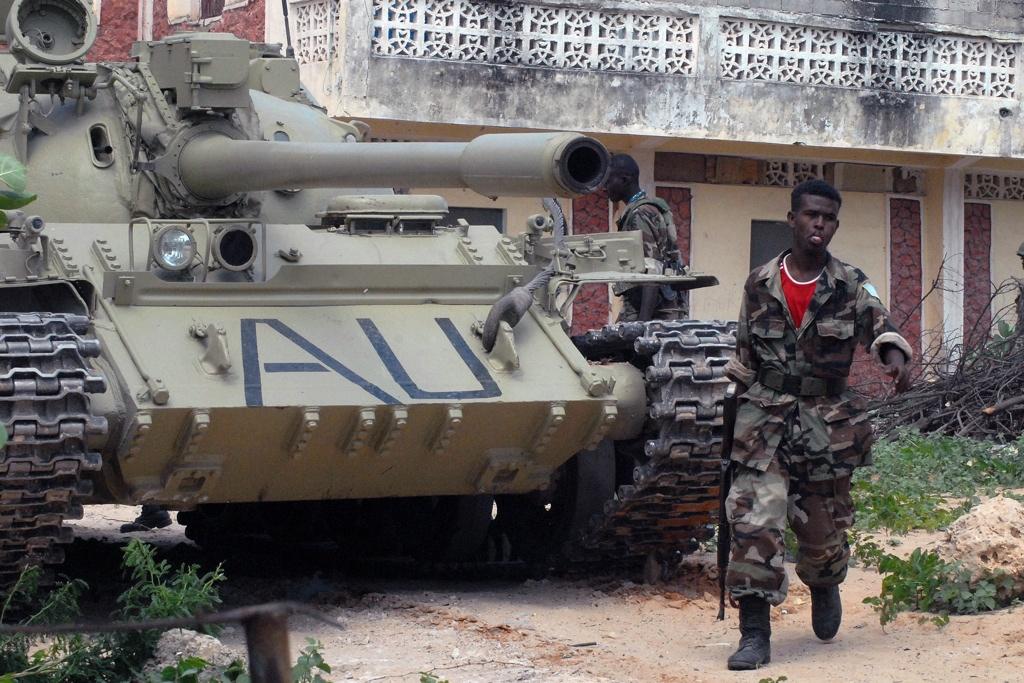Somalia: Government troops gain ground against Al Shabaab
A Somali government soldier walks past a tank belonging to the African Union peacekeepers near the frontline during heavy fighting against Al Shabaab insurgents on July 29, 2011. Fighting erupted the previous day near Mogadishu’s key Bakara market and Suqbacad areas, with the two sides exchanging heavy machine gun and artillery fire.
NAIROBI, Kenya — African Union soldiers and Somali government troops gained ground against Islamist insurgents in Mogadishu shortly after the first airlift of emergency food arrived in the capital to feed tens of thousands who have fled famine in the south.
At least six people were killed when heavy fighting erupted at dawn in the northeast of the city. Another 39 were wounded including 19 soldiers, according to reports.
African Union tanks launched the offensive and attacked positions held by Al Shabaab, the extremist group that is allied to Al Qaeda and which is battling against the United Nations-backed Transitional Federal Government (TFG) in Mogadishu.
The assault succeeded in wresting three areas from Al Shabaab control adding to the roughly 60 percent of the city currently occupied by government forces and the 9,000 AU soldiers deployed to protect President Sheikh Sharif Ahmed’s weak administration.
“Following a period of sustained provocation from Al Shabaab, our troops have dealt with specific security threats in a short tactical offensive operation,” said Lieutenant Colonel Paddy Ankunda, spokesman for the AU Mission in Somalia (AMISOM).
Ankunda said that one of the provocative attacks occurred Tuesday night when insurgents fired mortars, rocket-propelled grenades and machine guns at an AMISOM detachment just 2.5 miles from Badbado camp where some of the 25,000 people who have come to Mogadishu this month alone have gathered in search of life-saving food and water.
Thursday’s dawn offensive was planned to increase security and “ensure that aid agencies can continue to operate and get vital supplies to internally displaced persons,” said Ankunda.
But the new violence worried relief workers, who are struggling to bring aid to the war-torn country.
"The offensive and the increased security has potential severe implications,” said David Orr, a spokesman for the World Food Program (WFP), to reporters in Mogadishu where he was observing the offloading and distribution of 10 tons of emergency food airlifted from Nairobi on Wednesday.
“Our local partners who are transporting and distributing the food may be affected, but we are still hoping that most if not all operations will still be going ahead as planned,” said Orr.
The airlift was the first since the U.N. declared a famine in parts of Somalia last week and several more are expected in the coming weeks but access to Al Shabaab controlled territory is difficult.
The U.N. says that of the 11.5 million people facing severe food shortages in the Horn of Africa, 3.7 million live in Somalia and 2.2 million of those cannot be reached by WFP, because they are in areas controlled by Al Shabaab. WFP was accused of spying and banned by Al Shabaab in late 2009.
The lack of humanitarian access has compounded the effects of war in Somalia and drought in the wider Horn of Africa, triggering famine in two parts of Somalia controlled by Al Shabaab.
A U.N. report published Friday described a pattern of intimidation and extortion of aid workers by Al Shabaab.
“The single greatest obstacle to humanitarian assistance in Somalia … has consistently been the denial of access by armed opposition groups, principally by elements of Al Shabaab,” said the report by the U.N. Monitoring Group on Somalia and Eritrea.
There is no clearer illustration of how desperate the situation is in famine-hit Somalia than the makeshift camps packed with displaced people that are mushrooming across the bombed-out city, one of the most dangerous places in the world.
In recent years Al Shabaab has used the month of Ramadan, which begins this weekend, to launch offensives against the government. Ankunda said he fears "reckless attacks” by the insurgents may harm civilians seeking aid in the capital.
Some of the displaced huddled in a new camp in Mogadishu told the Associated Press that Al Shabaab fighters are trying to stop people leaving their areas in search of aid for fear it will undermine their power base and access to new conscripts.
“They're godless. They have no heart. They want people to die of hunger,” said Fatima Mohammed, a mother of five who had snuck out of an Al Shabaab-controlled part of the city at night to avoid detection.
Mohammed said that Al Shabaab told people they should die of hunger rather than accept help from Western countries.
Every day, reporters and producers at The World are hard at work bringing you human-centered news from across the globe. But we can’t do it without you. We need your support to ensure we can continue this work for another year.
Make a gift today, and you’ll help us unlock a matching gift of $67,000!
